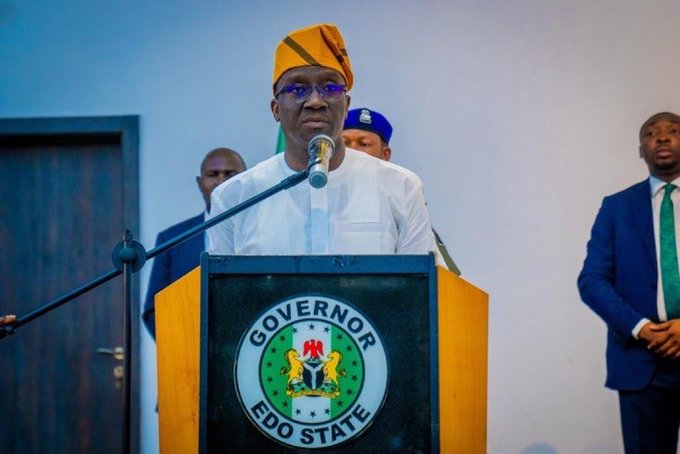News
Edo Gov Okpebholo Orders Probe into 17-Year-Old Who Bought 14,000 Hectares of Land in Cash
Edo State Governor Monday Okpebholo has ordered a probe into a 17-year-old boy who allegedly bought 14,000 hectares of land in cash.

- Edo State Governor Monday Okpebholo has ordered a probe into a 17-year-old boy who allegedly bought 14,000 hectares of land in cash, suspending all C-of-O issuances amid fears of money laundering.
- The government says the investigation aims to uncover the source of funds and strengthen transparency in land administration.
The Edo State Government has launched a full-scale investigation into a shocking case involving a 17-year-old boy who allegedly purchased 14,000 hectares of land in an all-cash transaction — a deal now raising serious questions about possible money laundering and financial irregularities.
Governor Monday Okpebholo made the disclosure on Tuesday in Benin City during a meeting with members of the Shift Naija Initiative, a civic organization focused on transparency and governance.

According to Okpebholo, the government has temporarily suspended the issuance of Certificates of Occupancy (C-of-O) statewide while officials scrutinize land transactions that may have been influenced by illicit funding.
“The investigation is ongoing to ascertain the source of livelihood of the possessor of the land to be able to acquire such a large expanse,” the governor said, reaffirming his administration’s zero-tolerance policy for shady land dealings.
The teenage buyer — whose identity remains undisclosed for legal reasons — reportedly paid the full amount for the land, which spans over 34,000 acres across multiple local government areas in Edo State. Officials say no loans, financing, or installment payments were involved, an unusual move that immediately triggered a financial intelligence review.
DON’T MISS: BREAKING: Senate Approves 10-Year Passport Ban For Nigerians Convicted Abroad
The Edo State Ministry of Lands and Surveys is leading the inquiry in collaboration with the Nigerian Financial Intelligence Unit (NFIU) and other anti-corruption agencies to trace the transaction trail and determine if the funds originated from legitimate sources.
Legal analysts suggest the case could fall under the Money Laundering (Prohibition) Act, which requires financial institutions to report cash transactions above ₦5 million — particularly when minors are involved.
Governor Okpebholo, who has repeatedly emphasized his administration’s commitment to land reforms, said the probe is part of broader efforts to clean up the state’s land governance system.

“We cannot allow land, a critical asset for our people’s future, to be manipulated by questionable means,” he said.
Civil society groups, including the Shift Naija Initiative, have commended the governor’s move, describing it as a “litmus test” for his pledge to promote accountability and transparency in land management.
“This case shows why Edo must tighten oversight of property transactions,” a representative of the group told reporters. “It’s not just about one teenager — it’s about preventing the misuse of wealth to corner public resources.”
The suspension of C-of-O issuance has already caused ripples in the real estate market, with developers and investors urging the government to expedite the review process. However, Okpebholo assured stakeholders that legitimate transactions would soon resume once “stronger safeguards” are implemented.
The ongoing probe marks one of Edo State’s most significant anti-corruption moves in recent years, aligning with Okpebholo’s broader agenda to restore public trust and ensure sustainable land management.
























You must be logged in to post a comment Login